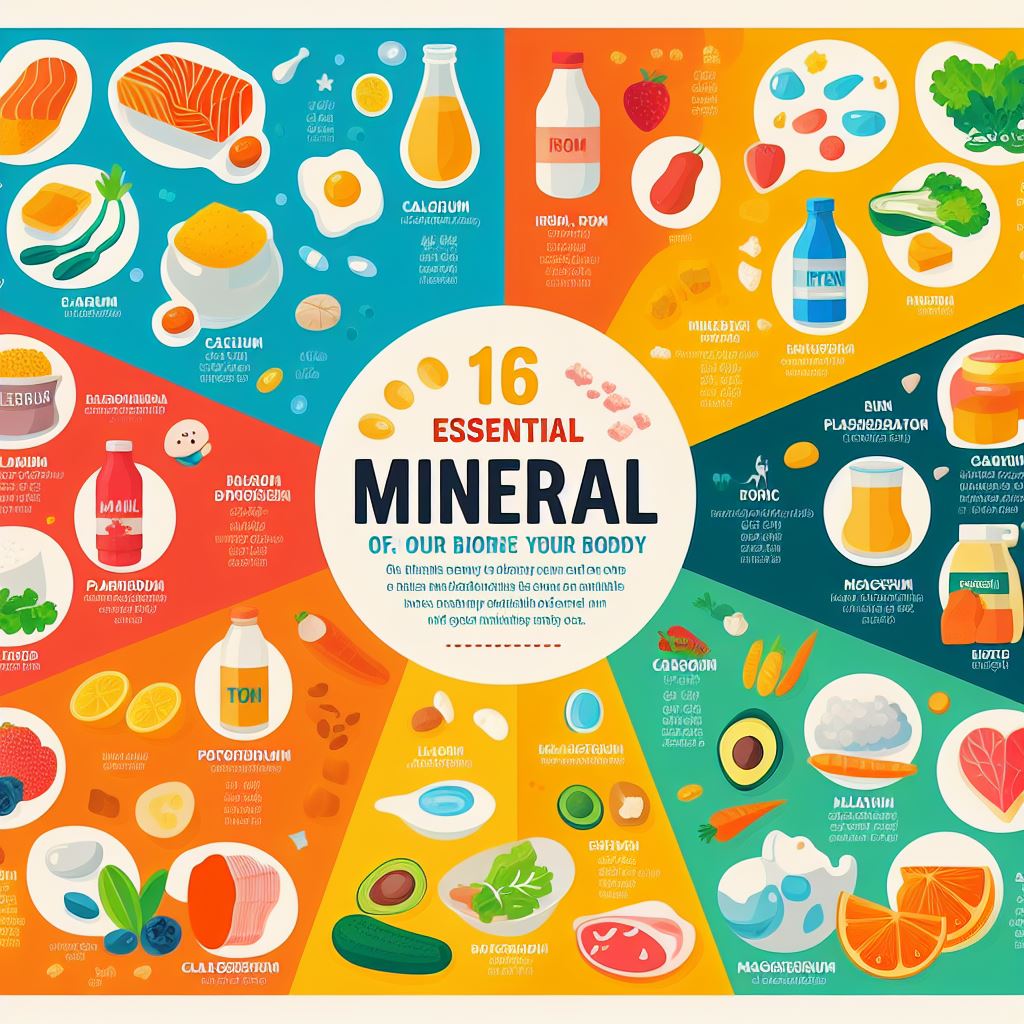All minerals are essential for the proper functioning of the human body. Each of them plays a specific role, in helping to maintain our health and well-being.
In this blog post, we will look at the main minerals needed by our body, explaining in detail their role and benefits.
1. Calcium:
Calcium is essential for the formation and maintenance of strong bones. It also plays a key role in the proper functioning of the nervous system and contributes to muscle contraction. To get enough calcium, include dairy products, green leafy vegetables, and nuts in your diet.
2. Magnesium:
Magnesium is involved in more than 300 enzymatic reactions in our body. It particularly supports energy production, blood pressure regulation, and muscle function. Green vegetables, dried fruits, seeds, and nuts are good sources of magnesium.
3. Iron:
Iron is essential for the formation of red blood cells and the transport of oxygen throughout the body. It is particularly important to prevent anemia. Red meats, green vegetables, beans, and lentils are rich in iron.
4. Zinc:
Zinc is involved in many chemical reactions in our body, including protein synthesis, cell growth, and immune function. Seafood, meat, nuts, and legumes are good sources of zinc.
5. Potassium:
Potassium is essential for maintaining fluid and electrolyte balance in our body. It is also important for muscle contraction and blood pressure regulation. Bananas, avocados, spinach, and potatoes are rich sources of potassium.
6. Sodium:
Sodium regulates water balance and osmotic pressure in our body. However, excessive sodium consumption can lead to hypertension. It is therefore important to limit salt consumption and favor foods rich in potassium to maintain a good balance.
7. Copper:
Copper is necessary for the formation of collagen and the absorption and use of iron. It also contributes to the functioning of the immune system. Seafood, nuts, seeds, and legumes contain copper.
8. Phosphorus:
Phosphorus is important for the formation and maintenance of strong teeth and bones. It also plays a role in energy metabolism and DNA synthesis. Dairy products, meat, fish, and nuts are good sources.
9. Manganese:
Manganese participates in bone formation, blood clotting, and the metabolism of carbohydrates and lipids. It is found in whole grains, nuts, green leafy vegetables, and fruits.
10. Iodine:
Iodine is essential for the production of thyroid hormones, which regulate the body’s growth and development. It is found in iodized salt, seafood, and seaweed.
11. Selenium:
Selenium is an antioxidant mineral that protects cells from damage caused by free radicals. It is also important for thyroid function and the immune system. Brazil nuts, fish, shellfish, and grains are good sources of selenium.
12. Fluoride:
Fluoride is essential for dental health and the prevention of tooth decay. Strengthens tooth enamel and prevents the breakdown of dental tissues. It is mainly found in fluoridated water, tea, and some fish.
13. Chromium:
Chromium plays a role in carbohydrate metabolism by helping to regulate blood sugar levels. It also promotes insulin production and can help control appetite. Whole grains, vegetables, and fruits are good sources of chromium.
14. Molybdenum:
Molybdenum is involved in several enzymatic reactions in our body. It plays an essential role in the metabolism of amino acids and carbohydrates. Legumes, grains, nuts, and green vegetables are good sources of molybdenum.
15. Cobalt:
Cobalt is a trace element necessary for the formation of vitamin B12. It also participates in the synthesis of hemoglobin and the production of blood cells. Animal products, such as meat, milk, and eggs, are high in cobalt.
16. Silicon:
Silicon plays a key role in the formation and maintenance of healthy bones, teeth, skin, and joints. It is also important for connective tissue and helps strengthen hair and nails. Silicon is found in whole grains, green vegetables, fruits, and some mineral waters.
Conclusion:
These minerals all play a vital role in the proper functioning of our body. To benefit from all the necessary nutrients, it is important to follow a balanced and varied diet, incorporating foods rich in minerals and avoiding deficiencies. Do not hesitate to consult a healthcare professional or nutritionist for more information on your specific mineral needs.

